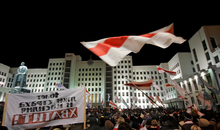Belarusian authorities arrested dozens of peaceful protesters and journalists across the country over the weekend in a massive escalation of their crackdown on freedom of expression and peaceful assembly, Amnesty International said today.
According to media reports, at least 48 protesters, including civil society leaders and independent journalists, were detained on 10, 11 and 12 March in connection with protests in the cities of Babruisk, Kobryn, Brest, Luninets and Maladzechna. The “We are not spongers” marches were called against a so-called “social parasite” tax imposed on unemployed people.
“With basic freedoms strangled in Belarus, it has been years since we saw protests of this scale, which appear to have taken the Belarusian authorities by surprise,” said John Dalhuisen, Director for Europe and Central Asia at Amnesty International.
“After initially allowing protests against the deeply controversial unemployment tax to proceed, now the authorities have returned to their habitual knee-jerk reaction of arresting peaceful demonstrators. This escalation is disturbing and the arbitrary detention of dissenting voices must end immediately.”
“The Belarusian authorities must not crack down on peaceful dissenters just for daring to voice their opinion. Instead of detaining them, the authorities must respect the rights to freedom of peaceful assembly and expression. Anyone arrested during the protests for peacefully criticizing the government must be immediately released,” said John Dalhuisen.
Background
The protests in Belarus erupted in mid-February after hundreds of thousands of unemployed Belarusians had received tax bills under the Presidential Decree “On Prevention of Social Dependency”. The Decree, adopted in 2015 in order to fight what the authorities called “social parasitism”, introduces a special tax for those who have been unemployed and not paid any tax contributions for over six months. This lump-sum tax rate is BYR 460 (US$ 245). The failure to pay the tax may result in administrative arrest and compulsory community service, which may amount to a form of forced labour.
After the first wave of protests, President Alyaksandr Lukashenka announced the suspension of the decree for a year in order to “correct” it. No one was detained during these initial protests, but at least 18 people were questioned by the police and a judge handed them administrative fines for attending an “unauthorised” rally.
On 10, 11 and 12 March at least 48 people, including protest organizers, other protesters and independent journalists, were detained across Belarus.
On Saturday, a court in Maladzechna, central Belarus, sentenced activists Yury Hubarevich, Anatol Liabedzka and Vital Rymasheuski to 15 days of administrative detention and activist Volha Kavalkova to 5 days in administrative detention for participating in an “unauthorized gathering”. Eleven other people in Maladzechna received administrative fines.
On 12 March, the police detained a group of opposition leaders and at least three journalists in Vorsha (eastern Belarus). Among those detained is former Amnesty International prisoner of conscience Pavel Sevyarynets. They were awaiting their trial to be held on Monday.
Trials of detained activists Andrey Denyushkin, Ruslan Khalikau, Z’mitser Levchuk, Uladzimir Asinchak, Kanstantsin Kopat’ and bloggers Z’mitser Garbunou and Syarhey Petrukhin were also scheduled on Monday in Brest (western Belarus).
For further information, pleasecontact Elizabeth Berton-Hunter, Media Relations 416-363-9933 ext 332 bberton-hunter@amnesty.ca






















